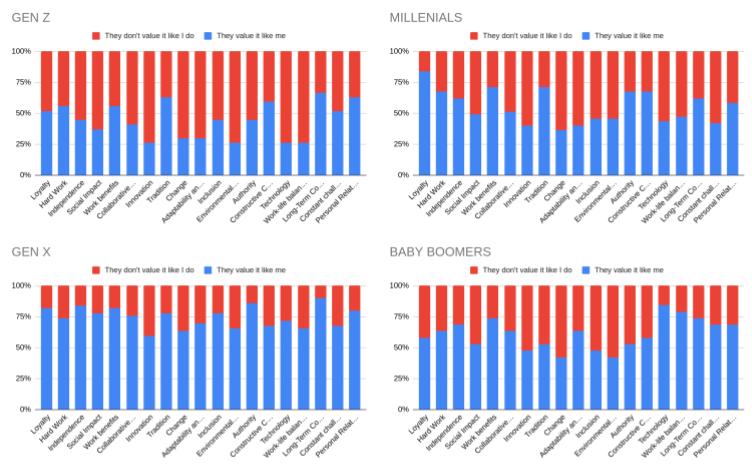26. Does Gen X colleagues value these caracteristics as much as you do?

This question investigates participants’ perceptions of the importance attached by Gen X colleagues to a number of professional and personal characteristics. The objective is to assess the degree of alignment between the values of Gen X and those of other generations, in order to better understand the dynamics of intergenerational collaboration and inclusion.
The characteristics considered are:
Loyalty, Hard work, Autonomy, Social impact, Benefits, Collaboration orientation, Innovation, Tradition, Change, Adaptability and flexibility, Inclusion, Environmental impact, Authority, Constructive criticism/feedback, Technology, Work-life balance, Long-term commitment, Constant challenges, Personal relationships.
The analysis of the perception of values attributed to Generation X shows an interesting mix of alignments and misalignments:
Generation X self-perceives themselves as strongly oriented towards stability, autonomy, authority, long-term commitment and personal relationships, while maintaining a moderate openness to innovation and change.
Younger generations (Gen Z and Millennials) tend to perceive Gen X as less innovative and change-oriented than Gen X perceives itself to be, but recognise a strong connection to more traditional values such as loyalty and commitment.
Baby Boomers show a perception partly aligned with Gen X on traditional values, but with some differences in terms of perceived loyalty and openness to change.
These findings are crucial for understanding the dynamics of intergenerational collaboration. Companies and teams should consider these perceptions in order to enhance Gen X’s strengths (stability, commitment, experience), but also promote dialogue and understanding on issues such as innovation and flexibility, to bridge perceived gaps and foster a more inclusive and effective work environment.
Generation X (self-perception):
Gen X perceives itself as highly aligned on values such as Long-Term Commitment, Authority, Independence, Loyalty, Work benefits, Personal Relationships, Tradition, Social Impact, and Inclusion. This indicates a strong identity based on stability, hierarchy, personal autonomy, but also on relational aspects and inclusion.
It shows a less pronounced alignment on Innovation, Change, and Work-life balance, suggesting that while they are not alienated from these concepts, they do not consider them as primary as other values.
Millennials:
Millennials perceive high alignment with Gen X on Loyalty, Work benefits, and Tradition.
However, they detect greater misalignment than Gen X’s own perception on Innovation, Change, Adaptability and Flexibility, and Technology. This suggests that Millennials see Gen X as less innovation- and change-oriented than Gen X perceives themselves to be.
Gen Z:
Gen Z shows a lower perception of alignment than other generations on many values, in particular on Innovation, Change, Adaptability and Flexibility, Environmental Impact, and Technology. This reflects a potential generational distance on the topics of innovation and dynamism.
They perceive a higher alignment on Tradition, Long-Term Commitment, and Personal Relationships, indicating that Gen Z ascribes more stable and durability-oriented values to Gen X.
Baby Boomers:
Baby Boomers show a variable perception of alignment. They recognise Gen X as having a high value for Long-Term Commitment and Tradition, which is consistent with the traditional values often associated with both generations.
However, their perceived alignment is relatively low on Loyalty and Change, suggesting some nuance in their perception of Gen X versus their self-perception of Gen X.
This post is also available in: German Italian Polish Portuguese (Portugal)







